The AMD Ryzen Threadripper 3960X and 3970X Review: 24 and 32 Cores on 7nm
by Dr. Ian Cutress, Andrei Frumusanu & Gavin Bonshor on November 25, 2019 9:05 AM ESTCPU Performance: Web and Legacy Tests
While more the focus of low-end and small form factor systems, web-based benchmarks are notoriously difficult to standardize. Modern web browsers are frequently updated, with no recourse to disable those updates, and as such there is difficulty in keeping a common platform. The fast paced nature of browser development means that version numbers (and performance) can change from week to week. Despite this, web tests are often a good measure of user experience: a lot of what most office work is today revolves around web applications, particularly email and office apps, but also interfaces and development environments. Our web tests include some of the industry standard tests, as well as a few popular but older tests.
We have also included our legacy benchmarks in this section, representing a stack of older code for popular benchmarks.
All of our benchmark results can also be found in our benchmark engine, Bench.
Speedometer 2: JavaScript Frameworks
Our newest web test is Speedometer 2, which is a accrued test over a series of javascript frameworks to do three simple things: built a list, enable each item in the list, and remove the list. All the frameworks implement the same visual cues, but obviously apply them from different coding angles.
Our test goes through the list of frameworks, and produces a final score indicative of ‘rpm’, one of the benchmarks internal metrics. We report this final score.
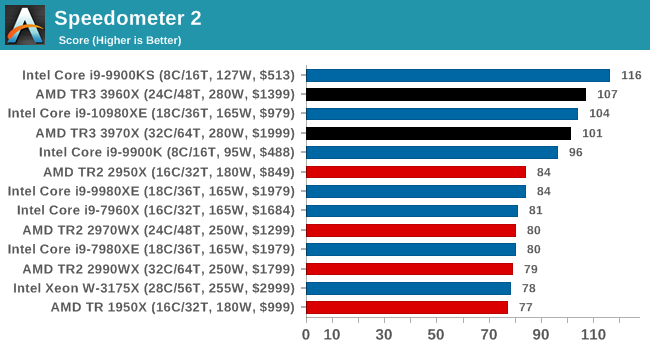
Google Octane 2.0: Core Web Compute
A popular web test for several years, but now no longer being updated, is Octane, developed by Google. Version 2.0 of the test performs the best part of two-dozen compute related tasks, such as regular expressions, cryptography, ray tracing, emulation, and Navier-Stokes physics calculations.
The test gives each sub-test a score and produces a geometric mean of the set as a final result. We run the full benchmark four times, and average the final results.
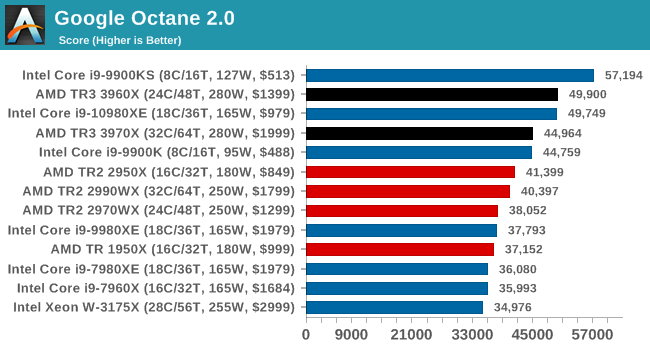
Mozilla Kraken 1.1: Core Web Compute
Even older than Octane is Kraken, this time developed by Mozilla. This is an older test that does similar computational mechanics, such as audio processing or image filtering. Kraken seems to produce a highly variable result depending on the browser version, as it is a test that is keenly optimized for.
The main benchmark runs through each of the sub-tests ten times and produces an average time to completion for each loop, given in milliseconds. We run the full benchmark four times and take an average of the time taken.
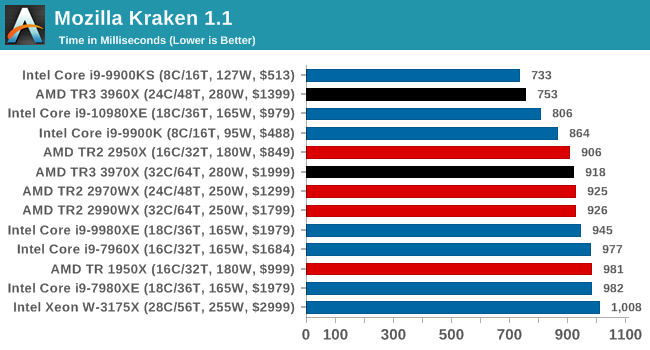
3DPM v1: Naïve Code Variant of 3DPM v2.1
The first legacy test in the suite is the first version of our 3DPM benchmark. This is the ultimate naïve version of the code, as if it was written by scientist with no knowledge of how computer hardware, compilers, or optimization works (which in fact, it was at the start). This represents a large body of scientific simulation out in the wild, where getting the answer is more important than it being fast (getting a result in 4 days is acceptable if it’s correct, rather than sending someone away for a year to learn to code and getting the result in 5 minutes).
In this version, the only real optimization was in the compiler flags (-O2, -fp:fast), compiling it in release mode, and enabling OpenMP in the main compute loops. The loops were not configured for function size, and one of the key slowdowns is false sharing in the cache. It also has long dependency chains based on the random number generation, which leads to relatively poor performance on specific compute microarchitectures.
3DPM v1 can be downloaded with our 3DPM v2 code here: 3DPMv2.1.rar (13.0 MB)
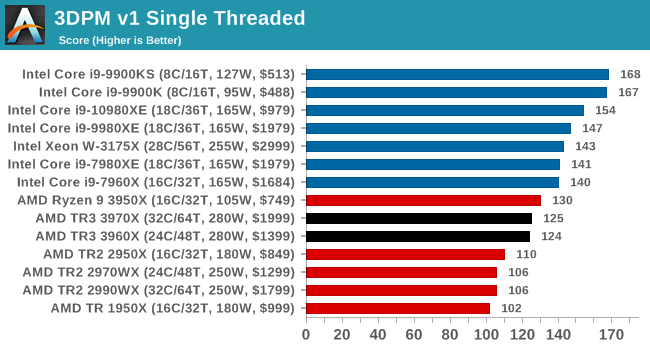
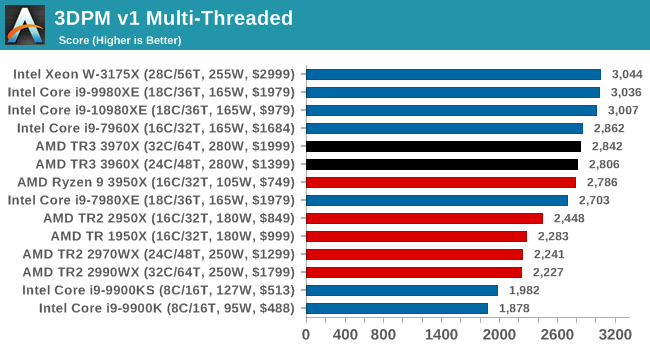
x264 HD 3.0: Older Transcode Test
This transcoding test is super old, and was used by Anand back in the day of Pentium 4 and Athlon II processors. Here a standardized 720p video is transcoded with a two-pass conversion, with the benchmark showing the frames-per-second of each pass. This benchmark is single-threaded, and between some micro-architectures we seem to actually hit an instructions-per-clock wall.
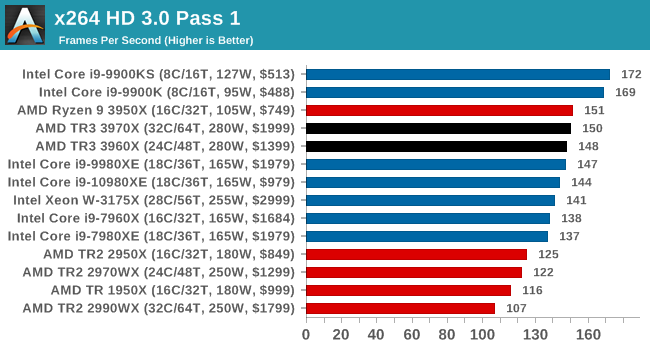
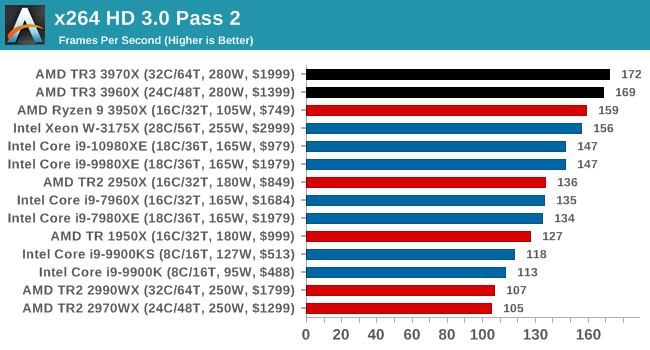
GeekBench4: Synthetics
A common tool for cross-platform testing between mobile, PC, and Mac, GeekBench 4 is an ultimate exercise in synthetic testing across a range of algorithms looking for peak throughput. Tests include encryption, compression, fast Fourier transform, memory operations, n-body physics, matrix operations, histogram manipulation, and HTML parsing.
I’m including this test due to popular demand, although the results do come across as overly synthetic, and a lot of users often put a lot of weight behind the test due to the fact that it is compiled across different platforms (although with different compilers).
We record the main subtest scores (Crypto, Integer, Floating Point, Memory) in our benchmark database, but for the review we post the overall single and multi-threaded results.
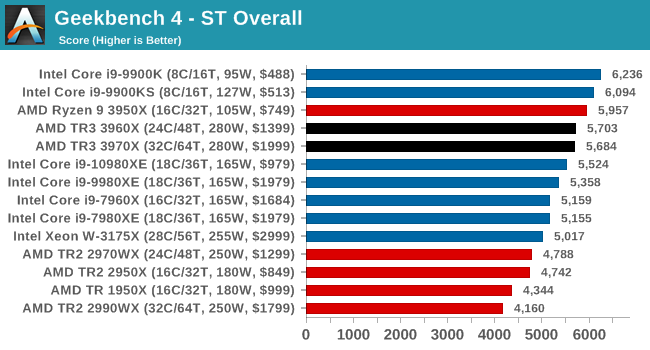
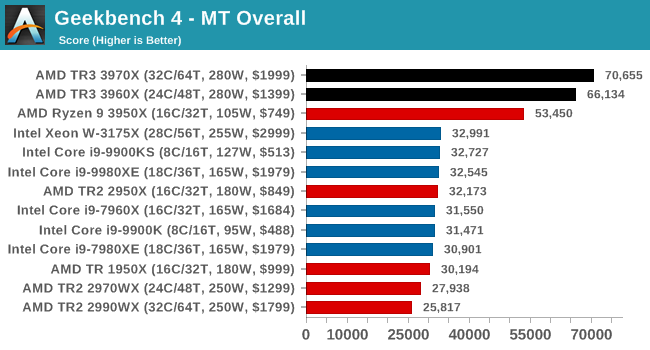










245 Comments
View All Comments
Xyler94 - Tuesday, November 26, 2019 - link
No, Dell EMC and HPE have both gone Epyc, Amazon is getting Epycs, Azure is getting Epycs, Google's Stadia runs on Epyc (That's another discussion though). Lots of big names are running Epyc now. It takes years to validate server equipment, unlike the enthusiasts, who can afford a bit of downtime here and there, servers cannot. So they experiment with new hardware for a year or two before implementing it. Remember that the 1.5 Exaflop Supercomputer is gonna be powered by AMD CPUs also.AMD is making big wins, but it takes a lot of time for the numbers to show
Teckk - Monday, November 25, 2019 - link
True, but neither does living in denial. So Intel launched their HEDT for half the price they would've otherwise launched, why would they if it was so good and would sell like crazy?Ignoring problems like 10nm and just quoting numbers gets boring quickly.
Total Meltdowner - Monday, November 25, 2019 - link
It's only downhill now.Supercell99 - Tuesday, November 26, 2019 - link
Also, AMD earnings are $0.03 per share. So really INTL can give their chips away for a few years if they wanted and crush amd until they get the performance advantage again. I love that AMD is back we need competition, but lets be real. To think INTEL is out of this is idiotic.bigvlada - Wednesday, November 27, 2019 - link
You might want to read about what happened when American Tobacco Company tried to give products for free in order to crush the competition.Marburg U - Monday, November 25, 2019 - link
Hmmm, still on QX9770 here. Will wait the next gen.o_O
ShowsOn - Monday, November 25, 2019 - link
Your CPU is slower than the US$49 Athlon 3000G that AMD released last week.peevee - Tuesday, November 26, 2019 - link
Actually, that would be a fun comparison. 4 10 y/o cores @3.2, vs 2 1.5-y/o cores+SMT @3.5...Teckk - Monday, November 25, 2019 - link
Agree with you on the price, maybe a little too expensive?When is the next new (non-Skylake) Intel chip coming? Is that TigerLake or Saphire Rapids in 2021?
Irata - Monday, November 25, 2019 - link
When comparing prices, let's not forget that Intel prices are OEM (when buying 1,000) units whereas TR prices are MSRP.But looking at actual performance and platform features, I honestly cannot see anyone who is not already on X299 even paying that much.